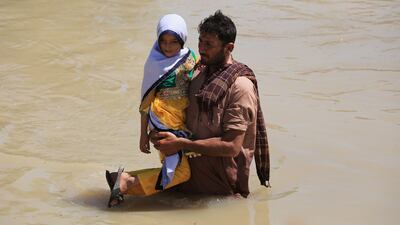There is only one month to go before Cop28 and if that is not enough to focus attention on the climate emergency, then the latest science is.
Research published this month showed major ice melt in west Antarctica is inevitable, putting some coastal cities in danger of being abandoned and endangers the livelihoods of communities around the globe.
And it will happen, scientists believe, no matter what cuts are made to warming emissions.
“If that’s the case, it will be profoundly damaging for the world,” said Bob Ward, policy director at the Grantham Institute for Climate Change at the London School of Economics.
“And is going to put at risk tens, if not hundreds of millions, of people who live around the world’s coastlines.”
It is the latest report in a year of boiling temperatures and extreme weather events that scientists believe are linked to climate change.
Against this backdrop, global leaders will meet from November 30 to December 12 to tackle the crisis.
With a month to go, can the crucial talks forge a global deal on adapting to a changing climate, scale up finance and agree on who should pay for the damages?

The global backdrop to the crucial talks
This year, the world has boiled. Earth has experienced the warmest month on record, the UN said, and it could potentially experience the hottest year ever.
Extreme weather events from droughts to floods are wreaking havoc around the world.
Experts now believe the world is on track to break the key 1.5°C threshold enshrined in the 2015 Paris Agreement, with the UN warning it could be headed for about 2.5°C. Long-term warming currently stands at about 1.1°C or 1.2°C compared with pre-industrial levels.
“We are in more danger than we realise,” said Mr Ward.
“That’s the background to these talks and that’s why the slow pace of action is such a concern. It is worse for the poorer people because they are the ones who are least able to protect themselves.”
A Middle East warming even faster
The situation is even more fraught in the Middle East.
Under extreme scenarios, the region could experience warming of more than 5°C, scientists believe, resulting in heat-related health issues, sandstorms, extreme humidity, higher desertification and more frequent cyclones, such as this month's Cyclone Tej.
“Climate change presents unique challenges to the Gulf Arab states,” noted Aisha Al Sarihi, research fellow on policy and politics of climate and environment at the National University of Singapore’s Middle East Institute.
She said temperatures in the summer are approaching “limits for human survival”.
Warming and rising seas in the Arabian Gulf also pose threats.
“On the marine front, the rising temperatures in the Arabian Gulf are leading to the bleaching of corals and oxygen loss, both of which are detrimental to the health of the Gulf's marine ecosystem and its biodiversity,” said Zouhair Lachkar, senior scientist at New York University – Abu Dhabi.
“Furthermore, the rising sea levels pose a threat to low-lying coastal urban areas in the region and put critical infrastructure at risk.”

Fossil fuels: phase down or phase out?
The talks are expected to be dominated by the “global stocktake”, an assessment of how the world is measuring up to the Paris deal.
But also on the switch to green energy, cutting emissions and scaling up climate finance including the thorny issue of loss and damage. But a sticking point could be fossil fuels, which are the main cause of warming emissions.
“Now this is going to be difficult,” said Mr Ward. “But fossil fuel producers are as exposed to the impacts of climate change as fossil fuel consumers.”
Despite the criticism the UAE has received over its role as an energy supplier, Dr Sultan Al Jaber, Minister of Industry and Advanced Technology and Cop28 President-designate, said he believed “phasing down demand for and supply of all fossil fuels is inevitable and essential”.
Mr Ward said there was a “lot of attention” on phase down or phase out. But “phase down is better than nothing”. What will be agreed to at Cop28 remains to be seen but the energy system is changing.
The most recent report from the International Energy Agency predicted renewables would provide half of the world's electricity by 2030.
But it warned emissions were still too high to prevent breaching the Paris goals and investment in fossil fuels needed to be reduced.
“While wealth served the Gulf countries to sustain their economic growth, it has also supported the Gulf countries to weather the impacts of climate change,” noted Ms Al Sarihi.
“The looming peak oil demand resulting from advanced climate mitigation measures and the vulnerability to oil prices fluctuations is of a particular concern for the Gulf producers, because transitioning away from fossil fuels will limit the bandwidth for economic diversification, as well as the countries’ ability to adapt and recover from the impacts of climate change.”
Developed countries must set the tone
Last year's Cop27 resulted in the establishment of a so-called loss and damage fund to help countries cope with climate disasters. How the fund works was left to be decided at Cop28.
But the debate exposed the fissure between wealthier countries, who are also often the worst emitters, and poorer nations that frequently bear the brunt of climate change without emitting as much.
“Rich countries have a moral duty to set a good example and, frankly, they are not,” said Mr Ward, stating the UK had set a “very bad example” on weakening some key policies, such as delaying the ban on the sale of new petrol and diesel cars to 2035.
He said the technology, such as the huge growth in electric vehicle batteries and solar panels, was coming through quickly, but this was being held back by lethargic government policies.
“It used to be that Cops were important for persuading business to move more quickly,” he said.
“But now many businesses are ahead of their governments and desperate for them to provide stronger and clearer policies.”
What would be a good Cop28 outcome?
The Cop process is consensus driven. This can make the talks contentious, time-consuming and often fraught as one country holding out can derail the entire outcome.
But experts believe the UAE can seize the opportunity.
“Cop28 will create further momentum for the Gulf states to advance their climate action ambitions and climate policy implementation,” said Ms Al Sarihi.
She said she expected the Cop28 presidency to put water, food security and climate finance at the top of the agenda and to reach a “consensus between parties” on accelerating an energy transition that supports a “gradual phase out” of fossil fuels and eliminate greenhouse gas emissions as much as possible.
She added the UAE would want to leave a “legacy on climate finance” that can bridge the gap between developed and developing countries.
“Realising the target of $100 billion annually from developed to developing countries will be the tone and legacy of this year’s Cop,” she said, referring the so far unfulfilled climate finance pledge.
Dr Lachkar said a good outcome should also include the development and sharing of concrete adaptation strategies, especially for more vulnerable regions.
He also called for a focus on nature-based solutions and “individuals can make a difference by reducing their carbon footprint, supporting sustainable practices and advocating for climate action”.
The talks are scheduled to finish on December 12, and while they are often forced into overtime, the world will soon find out what has been delivered to tackle climate change.
“But one thing is certain,” noted Mr Ward. “The window of opportunity is closing. There is no room for dithering.”


